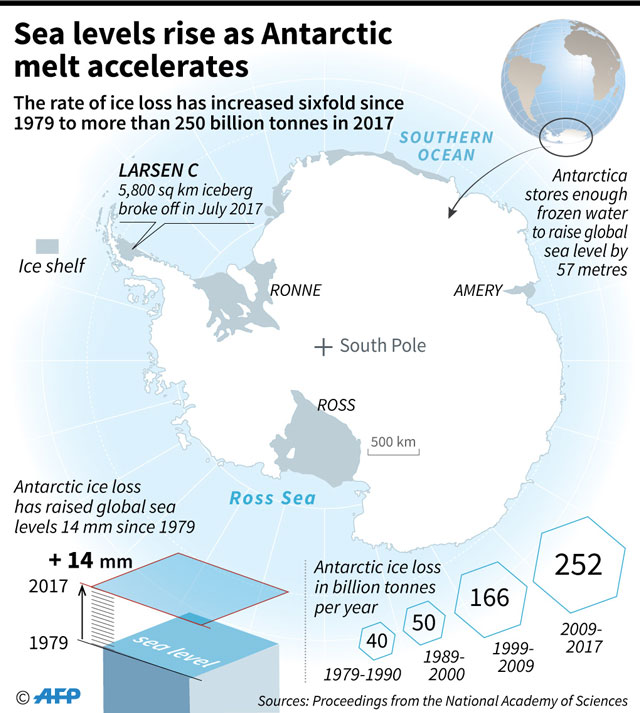
Tampa, United States | AFP | Global warming is melting ice in Antarctica faster than ever before — about six times more per year now than 40 years ago — leading to increasingly high sea levels worldwide, scientists warned on Monday.
Already, Antarctic melting has raised global sea levels more than half an inch (1.4 centimeters) between 1979 and 2017, said the report in the Proceedings of the National Academy of Sciences (PNAS), a peer-reviewed US journal.
And the pace of melting is expected to lead to disastrous sea level rise in the years to come, according to lead author Eric Rignot, chair of Earth system science at the University of California, Irvine.
“As the Antarctic ice sheet continues to melt away, we expect multi-meter sea level rise from Antarctica in the coming centuries,” Rignot said.
A rise of 1.8 meters (six feet) by 2100, as some scientists forecast in worst-case scenarios would flood many coastal cities that are home to millions of people around the world, previous research has shown.
For the current study, researchers embarked on the longest-ever assessment of ice mass in the Antarctic, across 18 geographic regions.
Data came from high-resolution aerial photographs taken by NASA planes, along with satellite radar from multiple space agencies.
Researchers discovered that from 1979 to 1990, Antarctica shed an average of 40 billion tons of ice mass annually.
By the years 2009 to 2017, the ice loss had increased more than sixfold, to 252 billion tons per year.
Even more worrying, researchers found that areas that were once considered “stable and immune to change” in East Antarctica, are shedding quite a lot of ice, too, said the study.
“The Wilkes Land sector of East Antarctica has, overall, always been an important participant in the mass loss, even as far back as the 1980s, as our research has shown,” Rignot said.
“This region is probably more sensitive to climate than has traditionally been assumed, and that’s important to know, because it holds even more ice than West Antarctica and the Antarctic Peninsula together.”
Warming ocean water will only speed up ice loss in the future, Rignot said.
Recent research has shown that oceans are heating up faster than previously thought, setting new heat records in the last few years.
 The Independent Uganda: You get the Truth we Pay the Price
The Independent Uganda: You get the Truth we Pay the Price



